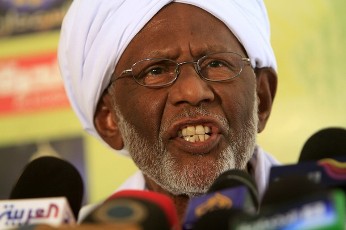Ex-US president invites Islamic leader Turabi to visit Washington: PCP
January 22, 2014 (KHARTOUM) – The United States former president Jimmy Carter has asked the leader of the opposition Popular Congress Party (PCP) Hassan Al-Turabi, to visit the United States and meet with influential figures and decision makers in Washington, a party figure said.

Carter met with representatives of the PCP on Wednesday and discussed Sudan’s political issues besides the ongoing conflict in South Sudan.
According to Rahma, Turabi expressed concern over the situation in South Sudan and predicted that war would fragment the newborn state particularly as the country is under military rule and lacks democratic institutions and strong political parties.
He said that the PCP delegation told Carter that stability in Sudan and South Sudan are interconnected due to long common borders between the two countries.
Rahma added the meeting discussed several other items including the proposals for new constitution and transitional government, pointing they noted to Carter the volatile political situation in Sudan.
The PCP official said they informed Carter about the need to establish an interim government and boycotting the 2015 general elections under the current circumstances and called for delaying it to 2017 besides drafting a new constitution through a constituent assembly which would consider possibility of forming interim government.
Sudan’s opposition parties demand the formation of a transitional government and holding a roundtable conference with the participation of rebel groups to discuss a peaceful solution for the conflicts in Darfur, South Kordofan and Blue Nile states.
The transitional government would organize general elections once a political agreement on constitutional matters is reached this inaugurating a new democratic regime. But the ruling National Congress Party (NCP) rejects this proposal saying that opposition parties must simply prepare for the 2015 elections and that rebels should first sign peace accords.
Rahma said Carter asked about the possibility of holding a national dialogue conference, stressing they told him the PCP is willing to engage in a comprehensive dialogue which includes opposition parties, the NCP, and the rebel armed groups in order to establish a transitional period similar to the one that which took place in Yemen.
Meanwhile, Carter announced readiness to mediate between the Sudanese government and the United States and initiate a dialogue with the US administration and other decision-making circles in order to restore relations between the two countries.
He also expressed hope and readiness to mediate between Khartoum and Juba to resolve the issue of the contested area of Abyei as well as bringing Sudanese government and opposition together for a dialogue on the new constitution and the upcoming elections.
The US ex-president said he is prepared to monitor the 2015 elections, demanding immediate stop for the war in Blue Nile, South Kordofan, and Darfur through a comprehensive national dialogue process.
He acknowledged in press statements following his meeting with the National Assembly speaker, Al-Fatih Izz Al-Deen, disagreement with some of the US administration’s stances, repeating his willingness to work towards rapprochement between Khartoum and Washington.
Carter pointed out that he discussed with Izz Al-Deen the need to subject relations between Khartoum and Washington to a deep dialogue which includes the US official institutions and the civil society organizations.
Izz Al-Deen, for his part, expressed the parliament’s desire to engage in dialogue with the US government bodies in order to explain Sudan’s political position and its relations with neighboring countries.
He said that Carter expressed considerable understanding for Sudan’s position and Sudanese-American ties, promising to open dialogue with the US corresponding institutions.
The speaker asserted that joint dialogue would lead to convergence of views on the various issues between Khartoum and Washington.
Izz Al-Deen briefed Carter on efforts for amending elections law and participation of all political forces in the 2015 elections besides drafting a permanent constitution.
Washington imposed economic and trade sanctions on Sudan in 1997 in response to its alleged connection to terror networks and human rights abuses. In 2007, it strengthened the embargo, citing abuses in Darfur which it says constitutes genocide.
In 2010, however, the US government announced it was easing sanctions on agriculture equipment and services, which allowed half a dozen companies to obtain export licenses.
Sudan has also been on the US list of states that sponsor terrorism since 1993, even though the two countries have strengthened their counter-terrorism cooperation since the September 2001 attacks on Washington and New York.
(ST)
